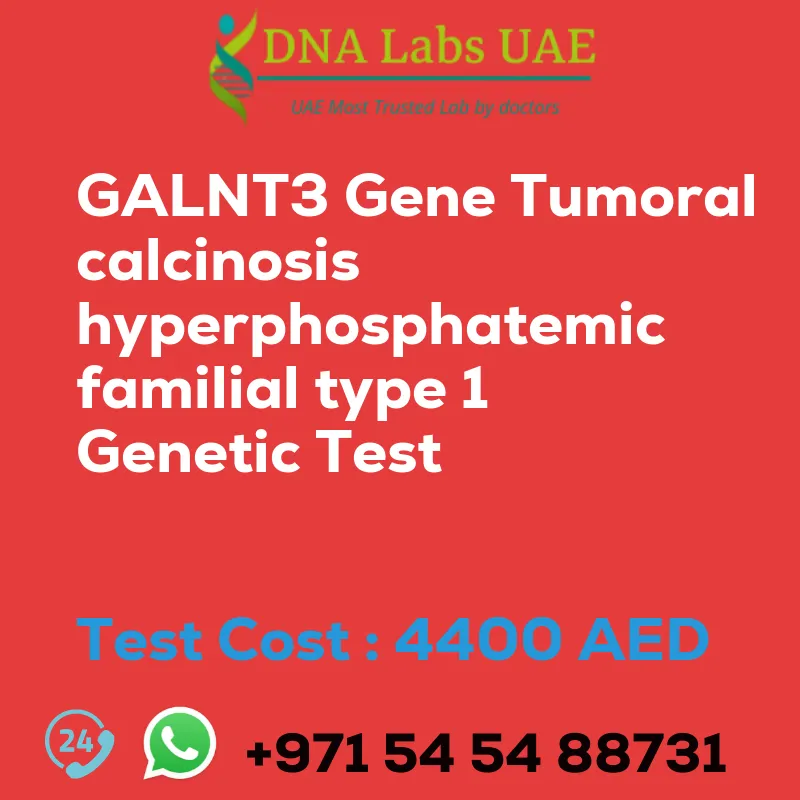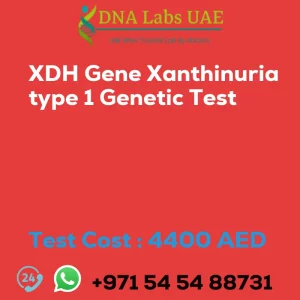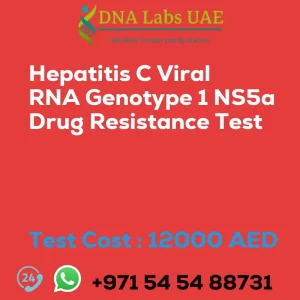GALNT3 Gene Tumoral calcinosis hyperphosphatemic familial type 1 Genetic Test
Are you or your family members experiencing symptoms of tumoral calcinosis, hyperphosphatemic, familial, type 1? DNA Labs UAE offers the GALNT3 Gene Tumoral calcinosis hyperphosphatemic familial type 1 Genetic Test to help diagnose and manage this rare genetic disorder.
Test Details
The GALNT3 gene is associated with tumoral calcinosis, hyperphosphatemic, familial, type 1 (TCHP1), a rare genetic disorder characterized by the abnormal deposition of calcium phosphate crystals in soft tissues. This leads to the formation of tumor-like masses, which can cause pain, limited joint mobility, and other complications.
Our NGS (Next-Generation Sequencing) genetic testing method allows for the simultaneous analysis of multiple genes, providing a comprehensive assessment of an individual’s genetic makeup. In the case of TCHP1, this test can identify mutations or variations in the GALNT3 gene, helping to confirm a diagnosis.
Test Components
- Price: 4400.0 AED
- Sample Condition: Blood or Extracted DNA or One drop Blood on FTA Card
- Report Delivery: 3 to 4 Weeks
- Method: NGS Technology
- Test Type: Metabolic Disorders
- Doctor: General Physician
- Test Department: Genetics
Pre Test Information
Prior to undergoing the GALNT3 Gene Tumoral calcinosis hyperphosphatemic familial type 1 Genetic Test, it is important to provide a clinical history of the patient. Additionally, a genetic counseling session may be conducted to draw a pedigree chart of family members affected by TCHP1. This information aids in the accurate interpretation of the test results and allows for appropriate management of the disorder.
Benefits of Genetic Testing for TCHP1
Genetic testing for TCHP1 can be highly beneficial for individuals with symptoms suggestive of the condition, as well as their family members who may be at risk. Some of the advantages of this test include:
- Early detection of the disorder
- Accurate diagnosis confirmation
- Appropriate management strategies
- Valuable information for genetic counseling and family planning purposes
It is crucial to note that genetic testing should always be performed and interpreted by qualified healthcare professionals, such as geneticists or genetic counselors. These professionals can provide the necessary guidance and support throughout the testing process.
| Test Name | GALNT3 Gene Tumoral calcinosis hyperphosphatemic familial type 1 Genetic Test |
|---|---|
| Components | |
| Price | 4400.0 AED |
| Sample Condition | Blood or Extracted DNA or One drop Blood on FTA Card |
| Report Delivery | 3 to 4 Weeks |
| Method | NGS Technology |
| Test type | Metabolic Disorders |
| Doctor | General Physician |
| Test Department: | Genetics |
| Pre Test Information | Clinical History of Patient who is going for GALNT3 Gene Tumoral calcinosis, hyperphosphatemic, familial, type 1 NGS Genetic DNA Test A Genetic Counselling session to draw a pedigree chart of family members affected with Tumoral calcinosis, hyperphosphatemic, familial, type 1 |
| Test Details |
The GALNT3 gene is associated with a rare genetic disorder called tumoral calcinosis, hyperphosphatemic, familial, type 1 (TCHP1). TCHP1 is characterized by the abnormal deposition of calcium phosphate crystals in various soft tissues, leading to the formation of tumor-like masses. These masses can cause pain, limited joint mobility, and other complications. NGS (Next-Generation Sequencing) genetic testing is a method used to analyze multiple genes simultaneously, providing a comprehensive assessment of an individual’s genetic makeup. In the context of TCHP1, NGS genetic testing can identify mutations or variations in the GALNT3 gene, helping to confirm a diagnosis. Genetic testing for TCHP1 can be beneficial for individuals with symptoms suggestive of the condition, as well as for their family members who may be at risk. It allows for early detection, accurate diagnosis, and appropriate management of the disorder. Additionally, genetic testing can provide valuable information for genetic counseling and family planning purposes. It’s important to note that genetic testing should be performed and interpreted by qualified healthcare professionals, such as geneticists or genetic counselors, who can provide appropriate guidance and support throughout the testing process. |








